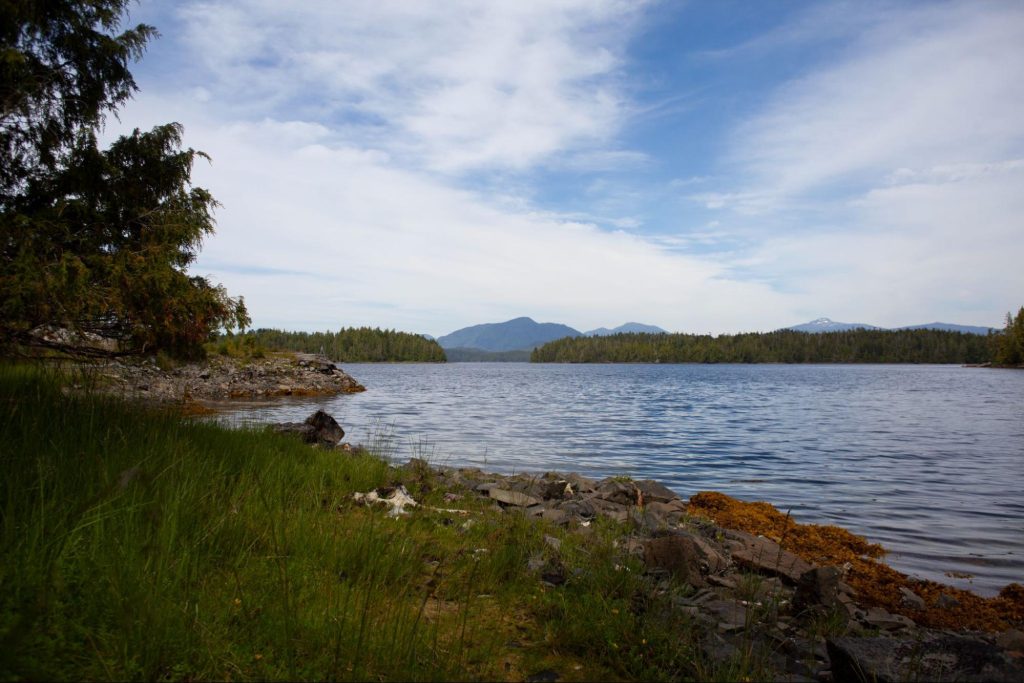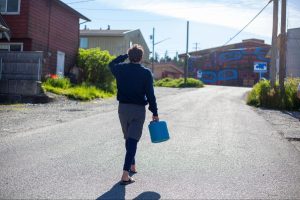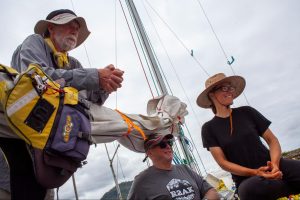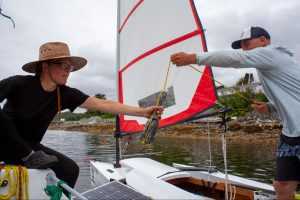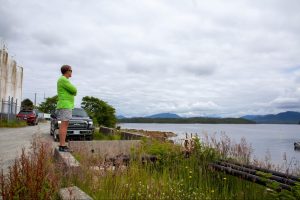July 6, 2022
By Lynnette Oostmeyer, Field Reporter
To me, Bella Bella, BC, simply marked a place in the race where I would no longer have the option to spend time with the teams. I was told that if I wanted to camp with anyone, it had to be before Bella Bella—that is where our resources ended. Because I knew from the start that I would not set eyes on that place, I never gave it much more attention than being aware of its position on the race course. After our, admittedly luxurious, support boat broke down in the Broughton Islands, I figured I would just be heading to Ketchikan to wait for teams there. But a phone call later, I found myself with a plan to travel to Bella Bella. I suddenly felt very undereducated about this place I would be traveling to, so I did what every teacher always tells you not to do, I read the Wikipedia page.
Two of the six paragraphs focused on the moving back and forth of the post office location and how it affected the town name. The rest shallowly explained where the town is situated along the Inside Passage and the industries that have come and gone over the years. It labeled the land as “an unincorporated community and Indian reserve.” As those teachers would have predicted, I learned very little from the page, and definitely did not have a good grasp on the Heiltsuk people that lived there.
My only contact in Bella Bella was Charmaine Lingard, a maternal children’s health nurse, who had been coming to the island since 2016. Her husband, Stuart Sugden, had been a physician at the hospital in years past, but this year would be returning to Bella Bella as a pit stop in his Race to Alaska as part of Team Fire Escape.
Because this option wasn’t one I had planned for, I called Charmaine to ask her if it was indeed a possibility for me to come stay with her and document the racers that would be coming through. The conversation was not what I expected it would be.
Charmaine said she would absolutely facilitate me coming to Bella Bella, but that I needed to understand the community was currently going through an intense mourning period, as there had been recent unexpected deaths. She described hours-long funeral processions and bans on any kind of celebration.
She had been the only local resource for the boats that had already come through the area. She would watch the tracker, while also trying to meet with her clients, so that when teams arrived she could explain the situation in the town and shuttle them off to her house to shower and do their laundry without causing a disruption to the community. In past race years there would be celebrations and banners when teams arrived in Bella Bella, but this year it almost seemed like a necessity that they have no presence at all.
“I was very impressed with all the boats that landed here,” Charmaine said. “Once I had a chance to explain the situation, they were all incredibly respectful.”
I got a small taste of that when I landed in Bella Bella last Sunday, not because I needed to not be seen, but because Charmaine was in the middle of her work day. She scooped me up from the airport and dropped me off at the house, and I wouldn’t see her again until late that night. Many teams had already gone through by the time I arrived, only six had yet to make it there, but Team Oaracle landed the same day I did. I was able to meet them at the dock, explain the atmosphere of the town the best I could, and document their short time there. We all chatted for a while, Ian restocked some supplies, and then they headed out.
This gave me a chance to walk around the town and try to get my bearings. Every single person that drove or walked past me said hello or waved. I was surprised to feel so welcomed by a community that I knew was in crisis. It felt friendly there, but it also felt a bit off. People waved but nobody smiled, the whole town just felt heavy.
When Charmaine got home that night I finally got the details that I needed to start understanding what the community had been going through since the start of the pandemic.
During the early days of the pandemic, the community leaders implemented a strict lockdown to try to keep their vulnerable community safe. Charmaine estimates that three in four adults in Bella Bella would be considered immunocompromised for one reason or another.
“For all intents and purposes, the island was shut down,” Charmaine said. “All the people you see out fishing every day could not leave. You could not gather or walk around town; it was a complete and utter lockdown.”
She described people having color-coded cardboard sheets that they would put up in their windows if they needed help. Groceries would be delivered to them and left outside. No house calls were allowed at all.
“I was doing home visits through the windows,” she said. “People were holding babies up for me to see through the glass.”
Only services deemed essential by the Heiltsuk Tribal Council remained open, including the health center where Charmaine works, the hospital, and the grocery store. The whole high school was made up into an emergency COVID ward because they just didn’t know what was going to happen. This was all at a heightened alert state; COVID had not yet found any footing in the community.
They stayed COVID-free until late 2021 when it was introduced to the community after some people had traveled for a basketball match. Charmaine said it then swept through the community at an incredible speed; luckily Bella Bella has one of the highest vaccination rates of reserves in the area.
“They did an amazing job getting the whole community vaccinated,” Charmaine said. “That’s the only thing that kept them from experiencing high casualty rates.”
Not only were lives lost during this time but the culture of the community was severely impacted. Like everywhere else, graduations were postponed, birthdays passed with no parties, babies were born with no family gatherings. But their mourning process was also interrupted, they could no longer gather and share in their grief.
“They are incredibly culturally oriented,” Charmaine said. “Everything is shared. If anyone dies they have a mourning room with up to 50 people inside, and they weren’t allowed more than five.”
Charmaine believes that having that community gathering aspect taken away was the trauma that hit them the most. She said that the songs they normally sing for the dead weren’t allowed. They had masks on, so they could not do the required facial expressions. And that normally following each death they would have up to four ceremonies, spread out over a year until the tombstone is placed. This became an impossibility. Families had to decide to just cremate their loved ones because time and space issues would not allow them to follow out the person’s wishes. The island used for burial is full, and it takes time to consecrate a new plot of land for proper burials.
“The rule is normally that if there is anything you want to celebrate during the mourning period, you have to get permission from the families to do it,” Charmaine said. “Because there were so many deaths, the elders and the language keepers decided that they don’t want to do any celebrations.”
No one could move on. Even when the fears of COVID would start to subside for a time, there was just no catching up with the amount of mourning that still needed to take place. It wasn’t just COVID deaths that the community had to deal with; there is always a yearly death rate. But between the start of 2020 and June of 2022, Bella Bella had lost 92 members. That’s almost ten percent of the community’s population. Just in the last two weeks of June, the community lost seven members, including elders, a 50-year-old who died of a massive heart attack, and two brothers who died in a house fire.
“They’ve gone to hell and back,” Charmaine said. “One of the elders said to me, ‘I’m an empty shell, I can’t do my mourning songs, I’ve got nothing left, and I’m too scared to look on Facebook because I’m scared to see who’s dead.’”
This is the climate that R2AK came through this year.
Stuart and the other members of Team Fire Escape were well aware of what the community had been dealing with, and originally said they didn’t even want to stop in Bella Bella out of respect. He asked Charmaine to speak with the elders to see what they would like him to do, and ultimately they were happy to have the team stop there. It would still be a few days until Team Fire Escape would arrive. Next to make it to Bella Bella was Lillian Kuehl of Team Interstice on that Monday.
She arrived with the feeling that she might end her race in Bella Bella, so Charmaine brought her out to one of her beloved spots of peaceful reflection. Lillian cooled her feet in the water and Charmaine went for a swim.
While Charmaine floated in the shallow waters she told me about the tall tree on the water’s edge. It had prayer flags hung on its branches. She said this is her place to come and think, and wash away the stress of the day. It’s her self-care. She says she is not a spiritual person, but she had been thinking about an experience she had two days earlier.
The elders had decided that they needed to perform a cedar washing ceremony for the first responders and anyone that felt they were a part of the grieving process after the house fire that claimed two lives. The Big House was full of people there to witness and partake in the process. A fire was burning cedar wood in the center of the room and an arch made of cedar branches was built just beyond the fire. Charmaine describes the process like this: “First you are given a gift, then you walk around the fire and through the arch. Then the women brush you with cedar branches, they turn you around and whisper a message that they think you need to hear. The Chief oversees the process, and then you walk out.”
Charmaine said she only watched for a while, did not participate, and then went back to her office across the street.
“It’s happened before but I never thought that I should go and see it,” she said. “I’m a Caucasian, African, Australian—it wasn’t meant for me and lots of the staff also felt that way.”
But after the main ceremony was done, a group of traditional healers, who had been flown in to perform cedar washings for anyone in the community, came over to the health center and offered it to the staff.

“It was quite uplifting, you felt very strong,” she said. “You just have to let yourself go through the motion, let the feelings in.”
She said that an experience like this one, and time spent with witch doctors in Africa, have proven to her that she knows enough to know that she knows nothing.
“It doesn’t really matter what you believe; it’s just the outcome that matters,” she said. “I felt that the building was a lot calmer after the ceremony.”
On Tuesday things started to change a bit in the town. The elders were starting to give permission to families to have small celebrations. The first of which was a happy birthday sign that appeared out front of the grocery store.
I started to notice small groups of people gathering all over town just to chat, and there was suddenly a buzz in the air. Now when people waved or said hello, their faces started to have warmth to them.
“It felt like everyone was just starting to emerge from their holes,” Charmaine said.
Over the next few days, those faces just got brighter and brighter. On an early morning walk past the grocery store, I heard music playing for the first time since I arrived; the song was Eye of the Tiger. Later that day while sitting inside, I heard dozens of cars coming my way honking their horns. When I got outside all the cars were covered in balloons celebrating the recent high school graduation of six students and two Heiltsuk language graduates. All graduation ceremonies had been called off since 2020. The next few teams were due to arrive any time now, and the possibility of having a small celebration for them was becoming more real.
Charmaine said that everyone at the health center and the hospital had been following the race and listening to her stories of the teams she had met so far. You would catch glimpses of the race tracker open on people’s screens, and a sign was hung up saying, “Don’t bring any laundry here, R2AK laundry is being done at the health center.”
“I had the laundry hanging up everywhere at the center and everyone was dodging under knickers and bras,” she said. “They would say, ‘This is great to see because we feel like someone out there is finally living,’ So for our little building it was wonderful to have the race here.”
When Team Fire Escape and Team Bangarang arrived on Wednesday, a small group of people had gathered on the dock to greet them. Charmaine said that it was the first time anyone had used a drum in celebration since the recent deaths. Over the next few hours the teams all caught up with each other, and Stuart had a chance to step foot in Bella Bella again.
Bella Bella ended up being the last stop for three of the six teams that went through the territorial waters while I was there. For all of us that were welcomed into this place, it seemed like a time that just naturally slipped into reflection. It gave us all a chance to stop, breathe, and think.
“It’s an amazing place,” Charmaine said. “When they welcome you into their lives, like they have myself and my husband, you feel very privileged.”
Charmaine said she is often asked why she keeps coming back year after year. She feels that if you support and strengthen a mother, she will strengthen her family, and the family will strengthen the community. She says that she has seen them taking control of their culture, revitalizing and empowering it. That they have some extremely strong female leaders that know the law, know what they are entitled to, and they stand up for themselves. They have kept oil barges out of their waters and stopped gas pipelines from running through their land.
“They are prepared to show the culture. It’s a live culture here,” she said. “You’ll come in and you see ceremonies and you see tradition. It’s not just put on for tourists; you integrate into the culture from the minute you step into this land.”
I hope to come back someday to see the community thriving and gathering and sharing, and to learn from them in their own words when they have the capacity to share. I feel honored and humbled that I was welcomed to spend time on Heiltsuk land and with the people that call it home. It’s a privilege that I won’t soon forget.
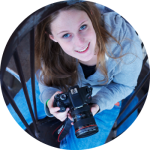 Lynnette Oostmeyer, field reporter
Lynnette Oostmeyer, field reporter
Lynnette is a freelance visual journalist based in northwestern Oregon, who focuses on documentary photography and short documentary filmmaking.
@lynnetteoostmeyer
